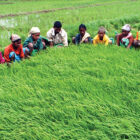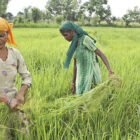Engineering a systematic failure of the rural co-operative banking sector would be an unpardonable desecration that seems to be in the making
Farmers accustomed to decades of government policy failure are willing to bear the pain caused by the government’s decision to recall ₹500 and ₹1,000 bills. The government, however, seems to be engineering a systematic failure of the rural cooperative banking sector, which would be an unpardonable desecration.
Rural bank branches have traditionally been given a step motherly treatment. Rural co-operative bank branches were not replenished with lower denomination currency, while the newer higher denomination notes were issued to bank branches in cities. Now all district co-operative banks have been directed not to exchange or even accept ₹500 and ₹1,000 bills from account holders. This will have a multiplier impact. Most small farmers deal with such banks and primary agricultural societies (PAX). Farmers receive most direct credit for farm inputs from the PAX. Possibly the establishment did not fully grasp the extent of the implications of the notification.
Farmers operate through these institutions for their Kisan credit cards. New rules will not allow them to deposit money in their own accounts but they will continue to be charged interest by the bank for the loan availed. Co-operative banks will start to collapse as they fail to recover loans. Being the sowing season, PAX stores are filled with fertilisers, they will be unable to supply these to their own farmers as per rules because past loans remain unpaid. These PAX, not even allowed to operate with public sector banks, are in a Catch-22 situation vis-à-vis their course of action.
Many farmers have also availed of the revolving cash credit limit that needs to be deposited at harvest time. When banks refuse to accept payment, these deposits will become NPA in the books of the bank and bank balance sheets will be decimated. People are starting to withdraw deposits from co-operative banks and good capital will flow to private or public sector banks, never to return. In rural co-operative banks branches with online facilities, this draconian notification should not have been evoked at all.
In one stroke, all rural banking transactions have been brought to a standstill. Problems were inevitable but the extent of mismanagement is astounding. The timing of the currency recall itself is intriguing. Exploitive traders are refusing to accept old notes. Shopkeepers are demanding 30 per cent higher value for the same inputs if purchase is with older notes. Villagers are being forced to exchange one ₹500 note for four bills of ₹100.
The ideal window for sowing wheat is about 21 days. Resourceful farmers may manage to do so but at a higher cost. Delayed sowing can reduce the yield drastically. Furthermore, farmers who take perishable fruits and vegetables to the wholesale market are being squeezed like lemons. Traders reason that small street vendors and shopkeepers do not have money to purchase perishables. Sales are down about 20 per cent and even prices received by farmers for their produce are down 25 per cent. Truck drivers get paid on delivery for their transport cost by the commission agent when perishables are delivered. Now traders at sabzi mandi insist on paying with old denomination currency that truck drivers refuse to accept. This is having a cascading effect. Possibly over a third in rural areas do not operate a bank account in a cash-based rural economy.
Specifically hurt are rural women who will have to reveal their savings to their husbands. Their secret stash, however small, took years to build. It is improbable that husbands will return the savings to the wife. It appears the consequences of this policy aren’t even gender neutral.
Additionally moneylenders and traders are making dependent gullible farmers to deposit old currency on their behalf. This will create interesting statistics that will be interpreted as proof of black money hoarded by the farmers and make a case for taxing farmer incomes.
A society that loses faith in its own currency is in a dangerously precarious situation. The economy is slowly grinding to a stop. Majority of the masses believe this bold reform is about striking at the root of the black money menace and still support the PM but it is turning into a situation where the government is hard pressed to make available cash in banks for people to exchange or withdraw. Unless addressed the repercussions of a badly executed transition may not only force the government to dilute the denotification provisions but it could be the ‘tipping point’ moment in the political lifespan of the leader. Leaders need to be responsive but a responsive leader is not necessarily a responsible PM. Yet, an unresponsive and irresponsible Opposition may not be able to save the day.




